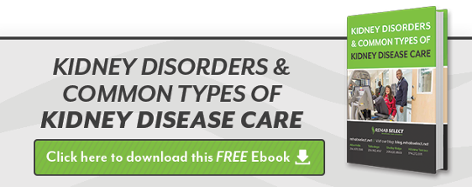 The kidneys are located on either side of the spine, just above the waist. Their most famous role is as a blood cleanser, whereby they remove waste and toxins so that those toxins can then be excreted from the body. They also help regulate blood pressure, maintain the proper balance of minerals and salts in the blood, and assist in red blood cell production. The kidneys also produce a form of vitamin D, necessary for healthy bones.
The kidneys are located on either side of the spine, just above the waist. Their most famous role is as a blood cleanser, whereby they remove waste and toxins so that those toxins can then be excreted from the body. They also help regulate blood pressure, maintain the proper balance of minerals and salts in the blood, and assist in red blood cell production. The kidneys also produce a form of vitamin D, necessary for healthy bones.
What happens when kidney disease occurs?
Kidneys become damaged by congenital disorders, injury, or infection so that fluid and waste products can build up in the body. Left untreated, kidney disease can cause kidneys to stop functioning altogether. This can lead to death if not treated.
What are the most common types of kidney disease?
- Chronic kidney disease
Chronic kidney disease is most often caused by high blood pressure and diabetes, in two thirds of chronic kidney disease cases.
- Polycystic kidney disease
Polycystic kidney disease causes cysts, or sacks of fluid, to grow on the surface of and inside the kidneys. These cysts can ultimately compromise kidney function.
- Glomerulonephritis
Tiny structures inside the kidneys called glomeruli filter the blood of toxins so that they can be excreted from the body. Infection, congenital abnormalities, and drug use can cause them to become inflamed, resulting in glomerulonephritis. Glomerulonephritis can get better on its own, or can be controlled by immuno-suppressive drugs.
Important facts about kidney disease care
When kidneys have been compromised and will not return to normal function, it is important to follow an established program of kidney disease care so patients stay as healthy as possible.
- Medications and supplements for kidney disease care
High blood pressure medications are an important part of kidney disease care, because high blood pressure can both cause and be caused by kidney disease.
Diabetes medications will also be prescribed if necessary to prevent further damage.
High cholesterol, anemia, edema, and weakened bones are also kidney disease complications that can be prevented or controlled with medication and supplements like calcium and vitamin D, as can high phosphates in the blood.
- Special diet
Kidney disease care requires a low-protein diet so that kidneys don't have to work as hard to filter waste products from the body. Patients may need to meet with a dietitian who will suggest ways to lower protein intake and still eat healthfully.
End-stage kidney disease care
If kidneys can no longer function efficiently enough to clear waste from the body on their own, dialysis or a kidney transplant may be required.
- Dialysis
Hemodialysis utilizes a machine that will filter blood when the kidneys can no longer do so, to remove waste products and extra fluid from the body. Peritoneal dialysis utilizes a dialysis solution in the abdomen that will absorb waste and extra fluid; the food is then drained out via a catheter inserted into the abdomen and replaced with a fresh one several times a day.
- A kidney transplant
A donor kidney either from a living or deceased donor can take over the function of the patient's own kidneys. Patients must take anti-rejection drugs for the rest of their lives to avoid rejecting donor kidneys.
Pursuing kidney disease care with the help of a skilled nursing facility
A skilled nursing facility can teach patients and their families kidney disease care for the home setting. Patients can be transferred to post-acute care after surgery to finish recovery and undergo physical rehabilitation before returning home; if they are receiving dialysis, they may be able to more conveniently receive dialysis services through a community skilled nursing facility, as residents or outpatients.





